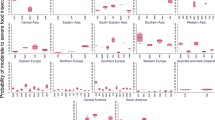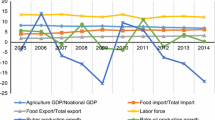Abstract
The Horn of Africa is the most food insecure region in the world. More than 40 percent of the population in the region is malnourished. This study aims to examine the effects of climate change on food insecurity using panel data from the Horn of Africa. The GMM estimator of the dynamic panel model was used to analyze the impact of climate change. The study findings show that food insecurity in the Horn of Africa is adversely affected by temperature. Keeping all other inputs constant, an increasing the mean temperature and carbon dioxide emissions by 1percent results in an increase in food insecurity of 0.357 percent and 0.026 percent, respectively. It was also observed that a 1 percent increase in precipitation resulted in a 0.023 percent decrease in food insecurity. The study results indicate that cereal yield, food production index, and political stability were significant and negatively influenced food insecurity. This study concluded that climate change results in food insecurity in the Horn of Africa, and food availability is expected to be reduced in the region. In order to cope with the adverse consequences of climate change, adopting high-temperature and drought-resistant varieties of improved food crops is advisable to ensure food availability and food security for the region.
Similar content being viewed by others
References
Abebe, G. (2017). Long-term climate data description in Ethiopia. Data in Brief, 14, 371–392. https://doi.org/10.1016/j.dib.2017.07.052
Adjei, V. (2021). Climate change: Threat to agricultural system and food security in Africa. Glob Scient Res Env Sci, 1(4), 1–05. https://doi.org/10.53902/GSRES.2021.01.000518
Ahsan, F., Chandio, A. A., & Fang, W. (2020). Climate change impacts on cereal crops production in Pakistan: Evidence from cointegration analysis. International Journal of Climate Change Strategies and Management. https://doi.org/10.1108/IJCCSM-04-2019-0020
Akinyemi, F. O., & Speranza, C. I. (2022). Agricultural landscape change impact on the quality of land: An African continent-wide assessment in gained and displaced agricultural lands. International Journal of Applied Earth Observation and Geoinformation, 106, 102644. https://doi.org/10.1016/j.jag.2021.102644
Alboghdady, M., & El-Hendawy, S. E. (2016). Economic impacts of climate change and variability on agricultural production in the Middle East and North Africa region. International Journal of Climate Change Strategies and Management. https://doi.org/10.1108/IJCCSM-07-2015-0100
Alvarez, J., & Arellano, M. (2003). The time series and cross-section asymptotics of dynamic panel data estimators. Econometrica, 71(4), 1121–1159. https://doi.org/10.1111/1468-0262.00441
Ani, K. J., Anyika, V. O., & Mutambara, E. (2021). The impact of climate change on food and human security in Nigeria. International Journal of Climate Change Strategies and Management. https://doi.org/10.1108/IJCCSM-11-2020-0119
Azadi, H., Burkart, S., Movahhed Moghaddam, S., Mahmoudi, H., Janečková, K., Sklenička, P., & Nadiri, H. (2021). Famine in the horn of Africa: Understanding institutional arrangements in land tenure systems. Food Reviews International. https://doi.org/10.1080/87559129.2021.1888974
Beyene, A. B. (2022). Governance quality and economic growth in Sub-Saharan Africa: The dynamic panel model. Journal of Economic and Administrative Sciences. https://doi.org/10.1108/JEAS-08-2021-0156
Blundell, R., & Bond, S. (1998). Initial conditions and moment restrictions in dynamic panel data models. Journal of Econometrics, 87(1), 115–143. https://doi.org/10.1016/S0304-4076(98)00009-8
Bun, M. J., & Windmeijer, F. (2010). The weak instrument problem of the system GMM estimator in dynamic panel data models. The Econometrics Journal, 13(1), 95–126. https://doi.org/10.1111/j.1368-423X.2009.00299.x
Cuni-Sanchez, A., Omeny, P., Pfeifer, M., Olaka, L., Mamo, M. B., Marchant, R., & Burgess, N. D. (2019). Climate change and pastoralists: Perceptions and adaptation in montane Kenya. Climate and Development, 11(6), 513–524. https://doi.org/10.1080/17565529.2018.1454880
FAO. 2022. Drought in the Horn of Africa – rapid response and mitigation plan to avert a humanitarian catastrophe: January–June 2022. Rome. https://www.fao.org/documents/card/en/c/cb8280en
Fajobi, T. A., Raheem, O. A., & Olajide, F. (2022). Food is inevitable but the land is mismanaged: Exploring the impacts of local actors utilization of land resources on food security in Nigeria. GeoJournal. https://doi.org/10.1007/s10708-022-10670-z
Firdaus, R. R., Senevi Gunaratne, M., Rahmat, S. R., & Kamsi, N. S. (2019). Does climate change only affect food availability? What else matters? Cogent Food & Agriculture, 5(1), 1707607. https://doi.org/10.1080/23311932.2019.1707607
Fitton, N., Alexander, P., Arnell, N., Bajzelj, B., Calvin, K., Doelman, J., & Smith, P. (2019). The vulnerabilities of agricultural land and food production to future water scarcity. Global Environmental Change, 58, 101944. https://doi.org/10.1016/j.gloenvcha.2019.101944
Ghebrezgabher, M. G., Yang, T., & Yang, X. (2016). Long-term trend of climate change and drought assessment in the Horn of Africa. Advances in Meteorology. https://doi.org/10.1155/2016/8057641
Gul, A., Xiumin, W., Chandio, A. A., Rehman, A., Siyal, S. A., & Asare, I. (2022). Tracking the effect of climatic and non-climatic elements on rice production in Pakistan using the ARDL approach. Environmental Science and Pollution Research. https://doi.org/10.1007/s11356-022-18541-3
Guntukula, R., & Goyari, P. (2021). How does the yield variability in rainfed crops respond to climate variables? Evidence from pulses yields in Telangana India. Journal of Agribusiness in Developing and Emerging Economies. https://doi.org/10.1108/JADEE-12-2020-0307.
Hasegawa, T., Fujimori, S., Havlík, P., Valin, H., Bodirsky, B. L., Doelman, J. C., Fellmann, T., Kyle, P., Koopman, J. F., Lotze-Campen, H., Mason-D’Croz, D. & Witzke, P. (2018). Risk of increased food insecurity under stringent global climate change mitigation policy. Nature Climate Change, 8(8), 699–703. https://doi.org/10.1038/s41558-018-0230-x
Iticha, B., & Husen, A. (2019). Adaptation to climate change using indigenous weather forecasting systems in Borana pastoralists of southern Ethiopia. Climate and Development, 11(7), 564–573. https://doi.org/10.1080/17565529.2018.1507896
Kebacho, L. L. (2022). The role of tropical cyclones idai and kenneth in modulating rainfall performance of 2019 long rains over East Africa. Pure and Applied Geophysics. https://doi.org/10.1007/s00024-022-02993-2
Kotir, J. H., (2011). Climate change and variability in Sub-Saharan Africa: a review of current and future trends and impacts on agriculture and food security. Environment, Development and Sustainability, 13 (3), 587–605. https://doi.org/10.1007/s10668-010-9278-0
Lewis, K. (2017). Understanding climate as a driver of food insecurity in Ethiopia. Climatic Change, 144(2), 317–328. https://doi.org/10.1007/s10584-017-2036-7
Lv, F., Deng, L., Zhang, Z., Wang, Z., Wu, Q., & Qiao, J. (2022). Multiscale analysis of factors affecting food security in China, 1980–2017. Environmental Science and Pollution Research, 29(5), 6511–6525. https://doi.org/10.1007/s11356-021-16125-1
Mahrous, W. (2019). Climate change and food security in EAC region: A panel data analysis. Review of Economics and Political Science. https://doi.org/10.1108/REPS-12-2018-0039
Marie, M., Yirga, F., Haile, M., & Tquabo, F. (2020). Farmers’ choices and factors affecting adoption of climate change adaptation strategies: Evidence from northwestern Ethiopia. Heliyon, 6(4), e03867. https://doi.org/10.1016/j.heliyon.2020.e03867
Mumo, L., Yu, J., & Fang, K. (2018). Assessing impacts of seasonal climate variability on maize yield in Kenya. International Journal of Plant Production, 12(4), 297–307. https://doi.org/10.1007/s42106-018-0027-x
Mason-D'Croz, D., Sulser, T. B., Wiebe, K., Rosegrant, M. W., Lowder, S. K., Nin-Pratt, A., Willenbockel, D., Robinson, S., Zhu, T., Cenacchi, N., Dunston, S., & Robertson, R. D. (2019). Agricultural investments and hunger in Africa modeling potential contributions to SDG2–Zero Hunger.World development, 116, 38–53. https://doi.org/10.1016/j.worlddev.2018.12.006
Ofori, S. A., Cobbina, S. J., & Obiri, S. (2021). Climate change, land, water, and food security: Perspectives From Sub-Saharan Africa. Frontiers in Sustainable Food Systems. https://doi.org/10.3389/fsufs.2021.680924
Onyutha, C., Turyahabwe, C., & Kaweesa, P. (2021). Impacts of climate variability and changing land use/land cover on river Mpanga flows in Uganda. East Africa. Environmental Challenges, 5, 100273. https://doi.org/10.1016/j.envc.2021.100273
Qu, C., & Hao, X. (2018). Agriculture drought and food security monitoring over the horn of Africa (HOA) from space. In 2018 7th International conference on agro-geoinformatics (Agro-geoinformatics) (pp. 1–4). IEEE. https://doi.org/10.1109/Agro-Geoinformatics.2018.8476128
Richardson, K. J., Lewis, K. H., Krishnamurthy, P. K., Kent, C., Wiltshire, A. J., & Hanlon, H. M. (2018). Food security outcomes under a changing climate: Impacts of mitigation and adaptation on vulnerability to food insecurity. Climatic Change, 147(1), 327–341. https://doi.org/10.1007/s10584-018-2137-y
Ramin, B. M., & McMichael, A. J. (2009). Climate change and health in sub-Saharan Africa: A case-based perspective. EcoHealth, 6(1), 52–57. https://doi.org/10.1007/s10393-009-0222-4
Seife, T. K. (2021). The impact of climate change on agriculture and food security in the greater horn of Africa. Politikon, 48(1), 98–114. https://doi.org/10.1080/02589346.2020.1861509
Smith, P., Calvin, K., Nkem, J., Campbell, D., Cherubini, F., Grassi, G., & Arneth, A. (2020). Which practices co-deliver food security, climate change mitigation and adaptation, and combat land degradation and desertification? Global Change Biology, 26(3), 1532–1575. https://doi.org/10.1111/gcb.14878
Solomon, N., Birhane, E., Gordon, C., Haile, M., Taheri, F., Azadi, H., & Scheffran, J. (2018). Environmental impacts and causes of conflict in the Horn of Africa: A review. Earth-Science Reviews, 177, 284–290. https://doi.org/10.1016/j.earscirev.2017.11.016
Stavi, I., Roque de Pinho, J., Paschalidou, A. K., Adamo, S. B., Galvin, K., de Sherbinin, A., & van der Geest, K. (2021). Food security among dryland pastoralists and agropastoralists: The climate, land-use change, and population dynamics nexus. The Anthropocene Review. https://doi.org/10.1177/20530196211007512
Traore, B., Corbeels, M., Van Wijk, M. T., Rufino, M. C., & Giller, K. E. (2013). Effects of climate variability and climate change on crop production in southern Mali. European Journal of Agronomy, 49, 115–125. https://doi.org/10.1016/j.eja.2013.04.004
Tumushabe, J. T. (2018). Climate change, food security and sustainable development in Africa. In The Palgrave handbook of African politics governance and development (pp. 853–868). Palgrave Macmillan, New York. https://doi.org/10.1057/978-1-349-95232-8_53
UNFCCC, 2007. (United Nations Framework Convention on Climate Change). Impacts, vulnerabilities and adaptation In developing countries. https://unfccc.int/resource/docs/publications/impacts.pdf
Ullah, S., Akhtar, P., & Zaefarian, G. (2018). Dealing with endogeneity bias: The generalized method of moments (GMM) for panel data. Industrial Marketing Management, 71, 69–78. https://doi.org/10.1016/j.indmarman.2017.11.010
WFP, 2014. (World food program). Climate change adaptation, Resilience building. Ethiopia annual report https://www.wfp.org/publications/annual-report-Ethiopia-2014
Warsame, A. A., Sheik-Ali, I. A., Ali, A. O., & Sarkodie, S. A. (2021). Climate change and crop production nexus in Somalia: An empirical evidence from ARDL technique. Environmental Science and Pollution Research, 28(16), 19838–19850. https://doi.org/10.1007/s11356-020-11739-3
Yifru, B. A., Chung, I. M., Kim, M. G., & Chang, S. W. (2021). Assessing the effect of land/use land cover and climate change on water yield and groundwater recharge in East African Rift Valley using integrated model. Journal of Hydrology: Regional Studies, 37, 100926. https://doi.org/10.1016/j.ejrh.2021.100926
Acknowledgements
We would acknowledge Jimma University due to their official assistances and supports.
Funding
The authors declare that no funds, grants, or other support were received during the preparation of this manuscript.
Author information
Authors and Affiliations
Contributions
All authors contributed to the study conception and design. Material preparation, data collection and analysis were performed by Yadeta Bedasa (PhD Candidate) and Amsalu Bedemo (Associate Professor). The first draft of the manuscript was written by Yadeta Bedasa (PhD Candidate) and all authors commented on previous versions of the manuscript. All authors read and approved the final manuscript.
Corresponding author
Ethics declarations
Conflict of interest
Authors, Yadeta Bedasa (PhD Candidate) and Amsalu Bedemo (Associative Professor) declare they have no financial interests. The authors declare no competing interests.
Consent to participate
The study was conducted with equal participation by all authors.
Consent for publication
The paper’s publication is permitted by all of the authors.
Ethical standards
Authors wish to declare that they have complied with all the ethical standards as it is required by journal of GeoJournal. All international standards have been adopted and compliance.
Additional information
Publisher's Note
Springer Nature remains neutral with regard to jurisdictional claims in published maps and institutional affiliations.
Rights and permissions
Springer Nature or its licensor holds exclusive rights to this article under a publishing agreement with the author(s) or other rightsholder(s); author self-archiving of the accepted manuscript version of this article is solely governed by the terms of such publishing agreement and applicable law.
About this article
Cite this article
Bedasa, Y., Bedemo, A. The effect of climate change on food insecurity in the Horn of Africa. GeoJournal 88, 1829–1839 (2023). https://doi.org/10.1007/s10708-022-10733-1
Accepted:
Published:
Issue Date:
DOI: https://doi.org/10.1007/s10708-022-10733-1




